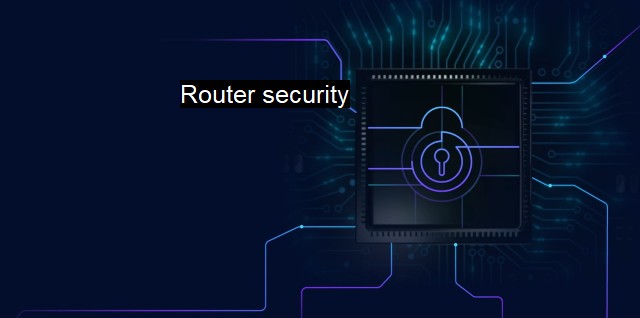What is Router security?
The Importance of Securing Your Router: Protecting Your Network from Cyber-threats
Router security refers to various measures and protocols that are put in place to secure a network router. The context of this is cybersecurity and antivirus, both of which play an integral part in the process. A router is a critical hardware component that handles data going in and out of your network. Given this pivotal role, it is a primary target for malicious individuals or institutions looking to gain unauthorized access to your private information.Therefore, maintaining router security is vital to prevent cyberattacks such as hacking, phishing, denial of service attacks, and malware intrusions. Router security is not merely about protecting your data from hackers or identity thieves. It also serves to protect your devices from being infiltrated and misused as a part of cyber-crime activities such as DDoS attacks against other networks.
Many routers come equipped with built-in security features such as firewalls to filter outgoing and incoming traffic, and encryption protocols, e.g., WPA2 or WPA3, that obscure the data to unauthorized individuals. these default settings may not be sufficient to ward off advanced threats. Consequently, additional security measures ought to be adopted to enhance router security.
One such measure is updating the router's firmware regularly. Firmware updates often include patches for security flaws that can be exploited by intruders. Unfortunately, many people neglect this step, thereby leaving their routers vulnerable to attack.
Another important measure is changing the default login credentials. Most routers come with preset passwords, which can be found with a simple internet search. Changing the default password and username is the first step towards ensuring router security.
Disabling remote access to the router's administration panel is a wise step. A remote access feature, when enabled, allows the user to configure its settings from any location. While this feature enhances convenience, it can inadvertently create a backdoor for intruders to compromise your network.
A user should also setup different networks for guests. It provides a segregated network access to guests, keeping the primary network and connected devices safe even if guest devices are compromised.
Regularly auditing the devices connected to your network can also significantly enhance router security. Should a hacker infiltrate your network, an audit could reveal the unauthorized device, alerting you to the intrusion.
Security technologies such as VPN can help to bolster router security. Typically, a VPN utilizes encryption to create a secure connection between one network and another over a public network such as the internet. Thus, when using a VPN, data that is in transmission gets encrypted, which renders it unreadable to hackers.
Reinforcing router security also involves optimizing network settings. This could involve disabling features that you don't use, thereby eliminating potential attack vectors, or limiting the range of your Wi-Fi to prevent a situation where hackers can connect to it from a range beyond which you intended.
Antivirus and anti-malware software are critical elements in delivering robust router security. By protecting the connected devices with a good antivirus software and a healthy internet behavior, the user can significantly minimize the chances of a malware intrusion. It's a dual approach – secure the router to protect the devices, and protect the devices to secure the router further.
Securing a router requires a layered approach, which combines physical, technical, and administrative measures. It is a continual process that involves regularly tracking and dealing with potential vulnerabilities, updates, and threats. By maintaining sound router security, individual and corporate users can protect themselves from severe financial and reputational harm that might result from a data breach or compromise.

Router security FAQs
What is router security and why is it important?
Router security is the configuration and implementation of measures that protect the router and its network from cyber-attacks. It is important because routers are one of the most targeted devices by hackers, and once they gain access, they can steal sensitive information, install malware, or launch additional attacks.What are some common router security vulnerabilities?
Some common router security vulnerabilities include weak passwords or default credentials, outdated firmware, outdated or unpatched software, open ports, and misconfigured settings.How can I improve my router security?
You can improve your router security by changing the default login credentials, updating the router's firmware, enabling WPA2 encryption, disabling remote management, disabling UPnP, and regularly checking for and installing security updates. You can also consider using a virtual private network (VPN) for added security.What are some signs that my router security may have been compromised?
Some signs that your router security may have been compromised include slow network speeds, frequent disconnections, unusual activity in your network logs, the appearance of unrecognized devices in your network, and difficulty logging in to the router's admin panel. If you suspect your router security has been breached, it is recommended to immediately change login credentials and seek further assistance from a cybersecurity professional.| | A | | | B | | | C | | | D | | | E | | | F | | | G | | | H | | | I | | | J | | | K | | | L | | | M | |
| | N | | | O | | | P | | | Q | | | R | | | S | | | T | | | U | | | V | | | W | | | X | | | Y | | | Z | |
| | 1 | | | 2 | | | 3 | | | 4 | | | 7 | | | 8 | | |||||||